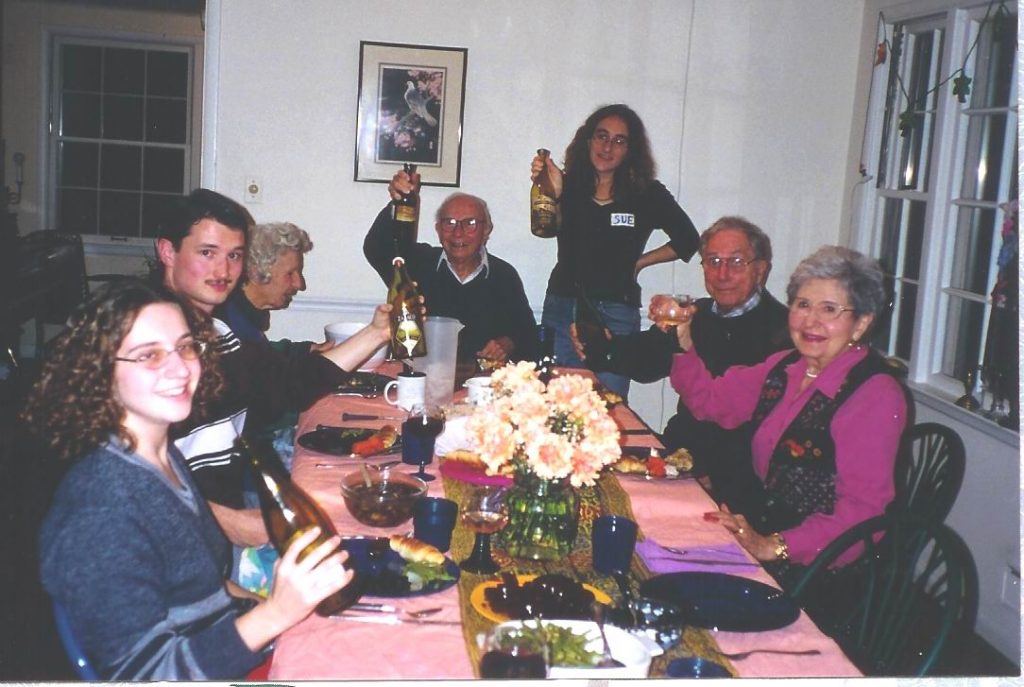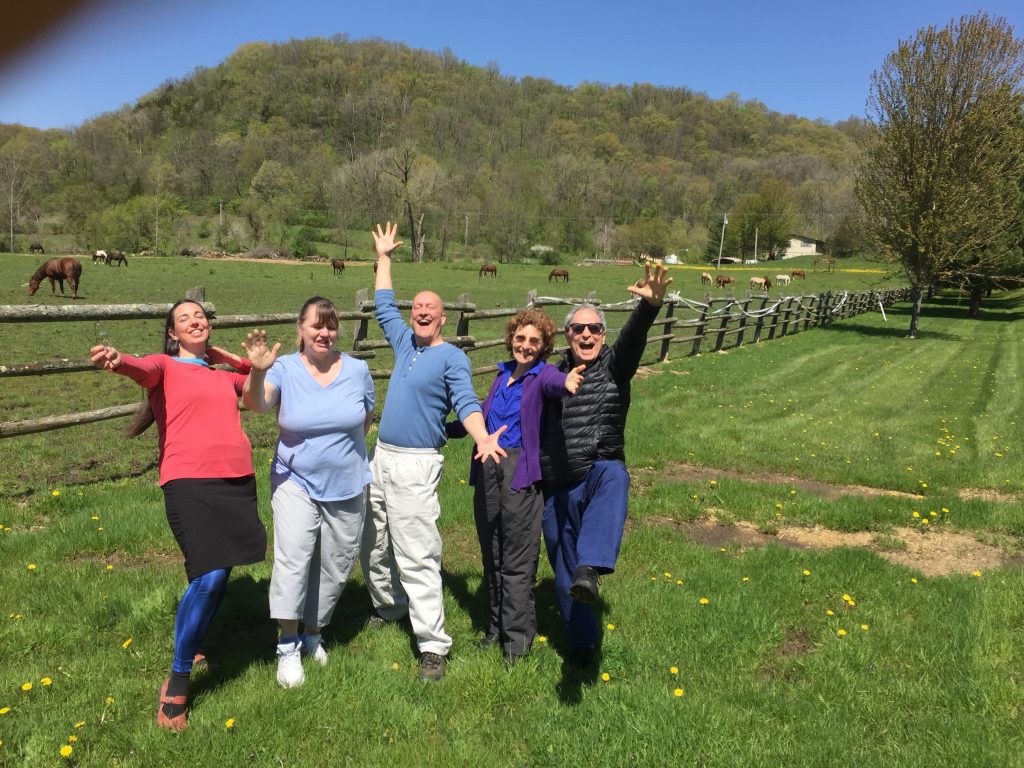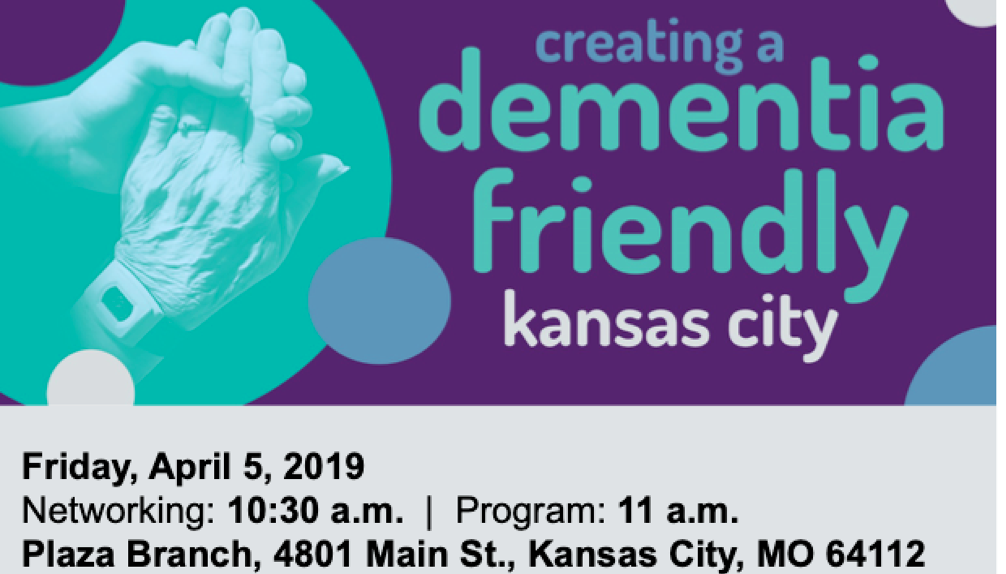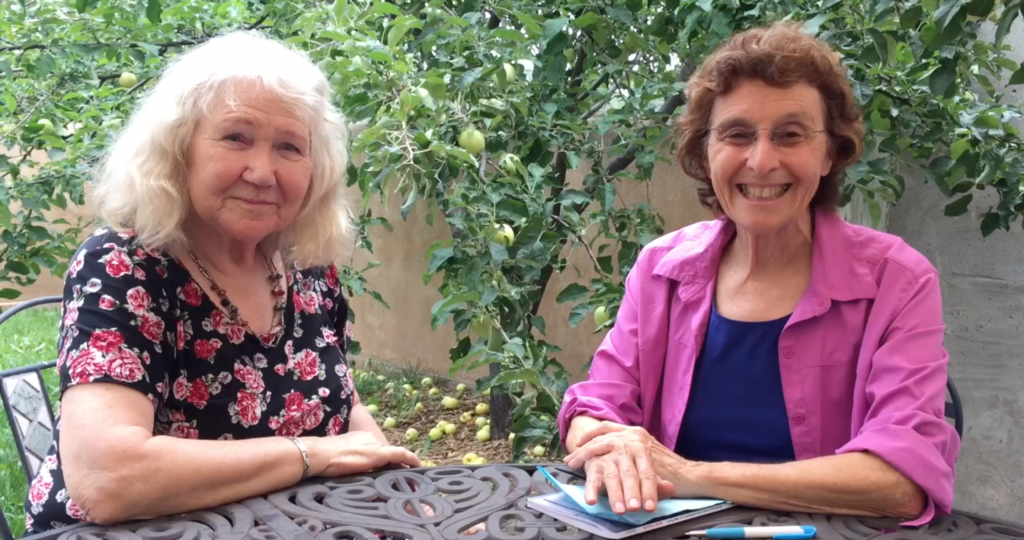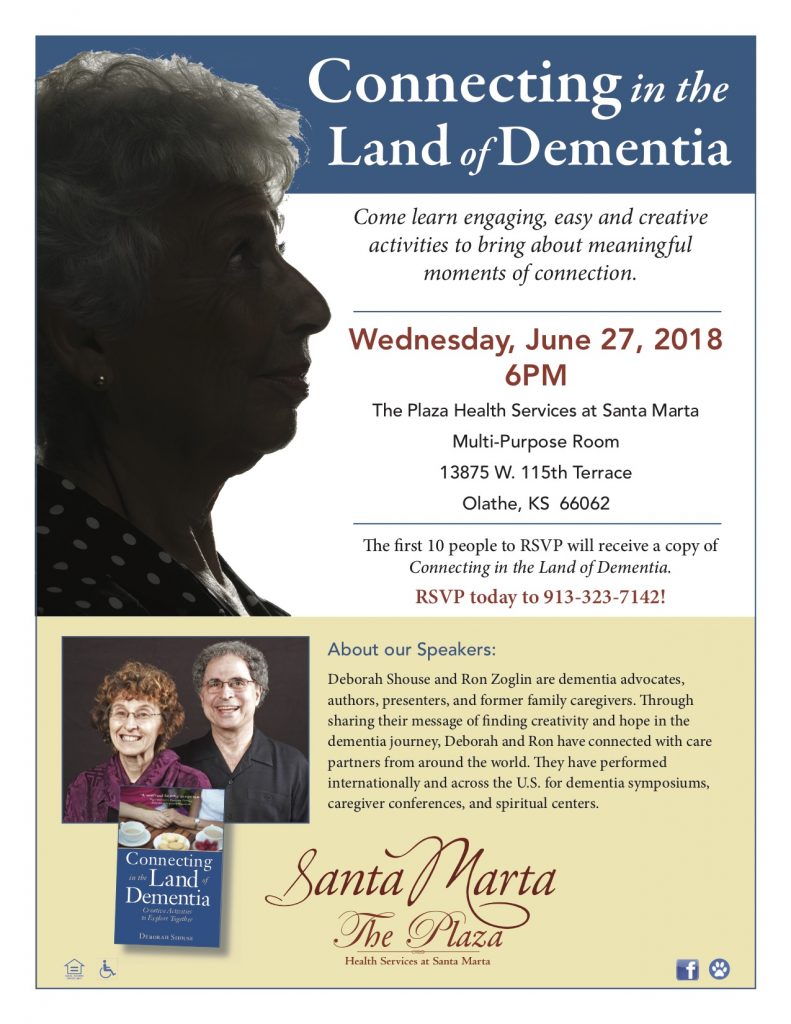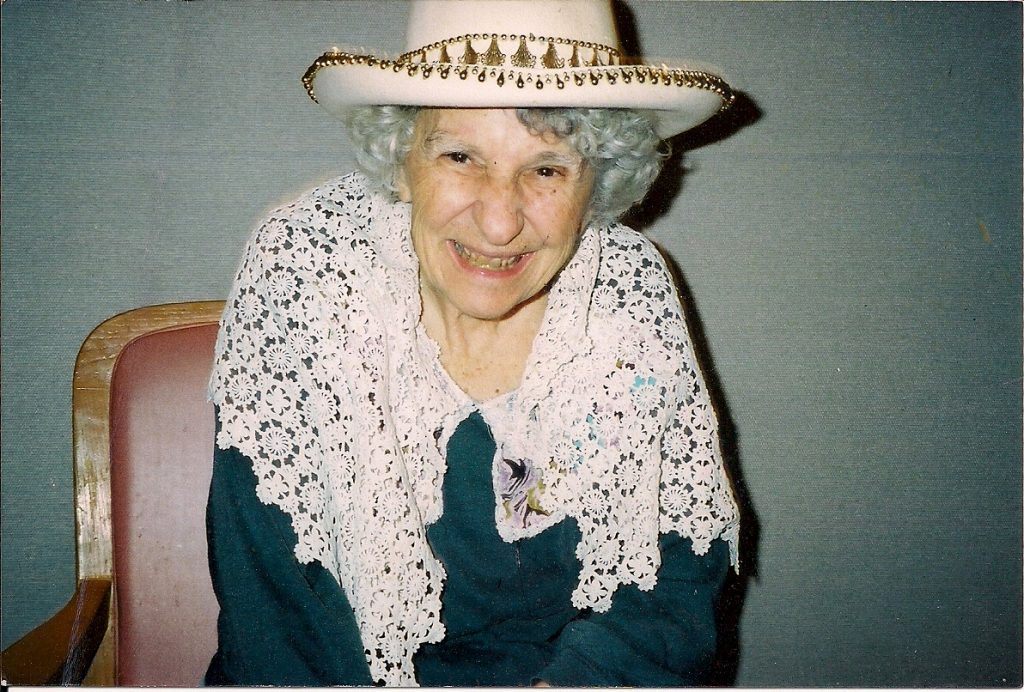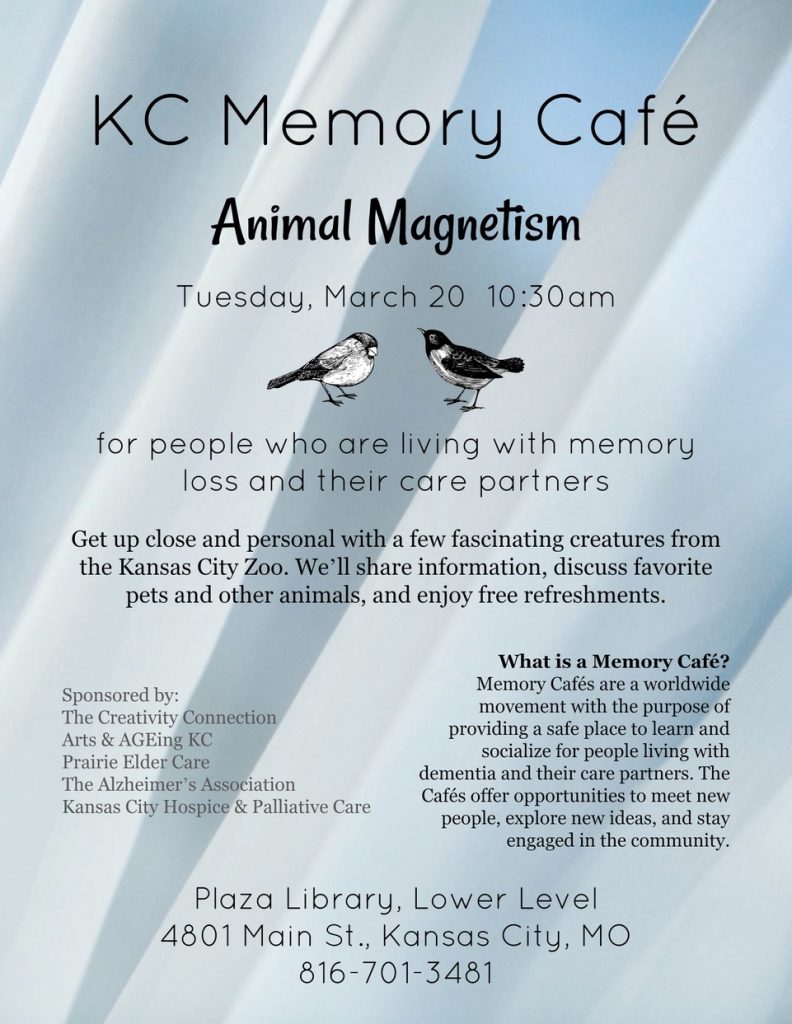Posts Tagged ‘alzheimer’s’
Seven Secrets of Dementia Inclusive Holiday Cooking
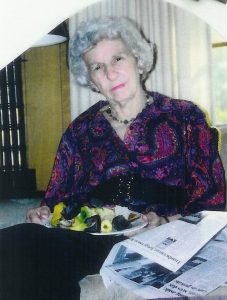 “Who prepared this delicious meal?” a friend asked during a holiday dinner.
“Who prepared this delicious meal?” a friend asked during a holiday dinner.I named my brother Dan, our head chef, first. Then I included the support team—myself, my mom, my daughters and nephews.
“Did I help?” Mom whispered as I passed her the mashed potatoes.
“You sure did,” I told her. ”You mashed the potatoes, put the marshmallows on the sweet potato casserole, and mixed the fruit salad.”
“That’s good,” she said. “I like to help.”
Our desire to help and contribute to seasonal celebrations doesn’t end with a diagnosis of dementia. It’s lovely to linger in the kitchen together, preparing food for the holidays. It’s even lovelier when you can adapt and enjoy dementia inclusive holiday cooking so that people of varying abilities can participate.
Rebecca Katz, author of The Healthy Mind Cookbook, sees food as a great equalizer, something anyone can enjoy regardless of abilities. Fixing a delicacy for someone offers a tangible and delicious way to give back.
Here are six secrets of dementia Inclusive holiday cooking.
- Leaf through a favorite family cookbook or recipe box and use the pictures and recipes as a catalyst for conversation. Ask open-ended questions, such as, ”What does that brownie recipe make you think of?” “What do you like about the holiday season?”
- Chose a time of day when you’re both rested.
- Create a comfortable kitchen environment, by playing familiar seasonal songs you can both hum or sing along to.
- Reduce extraneous noise and distractions, such as a television in the background.
- If you wish, take photos during the experience. That way, you can relive the adventure and share with family and friends.
- Indulge in instant gratification, if possible, by sampling your work when the cooking is complete.
- Even if the person living with dementia can’t help prepare food, he can still enjoy sitting in on the action and the conversation.
Whether you’re stirring a pot of orzo or dropping mint leaves into cool water, enjoy your time of creation and connection in the kitchen.
A longer version of this piece originally appeared on Joan Lunden’s excellent website: Enjoy Dementia Inclusive Holiday Cooking. Thanks to Sue Fitzsimmons, MS, ARNP, Judith Fertig, author of The Memory of Lemon, Kate Pierce, LMSW, Alzheimer’s Association Greater Michigan Chapter, and Rebecca Katz, author of The Healthy Mind Cookbook
Deborah Shouse is the author of Connecting in the Land of Dementia: Creative Activities to Explore Together and Love in the Land of Dementia: Finding Hope in the Caregiver’s Journey.
Laughing All the Way: Boosting Health and Happiness
“When You Laugh, you change,
and when you change the whole world changes.”
-Dr Madan Kataria, MD, Founder Laughter Yoga Movement
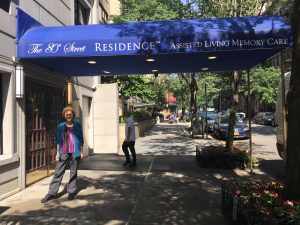 We were warmly welcomed into a parlor area, reminiscent of an elegantly aging aunt’s apartment. A piano waited patiently along one wall. There was a colorful bowl of fruit and a tempting array of pastries and fruit-infused waters. As we waited, we looked out into an outdoor garden and picnic area. The 80th Street Residency, a memory care community in Manhattan, created a warm, home-like atmosphere for its residents. Ron and I had come here to offer a laughter yoga class, hoping to boost our participants’ health and happiness. We worked with their activities coordinator, Jackie LaBau.
We were warmly welcomed into a parlor area, reminiscent of an elegantly aging aunt’s apartment. A piano waited patiently along one wall. There was a colorful bowl of fruit and a tempting array of pastries and fruit-infused waters. As we waited, we looked out into an outdoor garden and picnic area. The 80th Street Residency, a memory care community in Manhattan, created a warm, home-like atmosphere for its residents. Ron and I had come here to offer a laughter yoga class, hoping to boost our participants’ health and happiness. We worked with their activities coordinator, Jackie LaBau.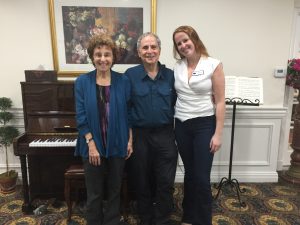
Here’s what we’ve learned about laughter yoga: often people look, act, and feel differently after they’ve experienced a session. There is a magic about intentionally laughing with a group. The experience of breathing, clapping, engaging in playful imaginings, and of course, laughing, soon softens the spirits. People feel energetic and connected. Everyone, including staff, residents, and us, leave feeling happier. That’s what happened in New York, just as it has every time Ron and I have led laughing sessions.
Back home in Kansas City, we laughed with the lively people at Jeanne’s Place, CareHaven’s day program for people living with early stage dementia. We have laughed with these wonderful folks before, and now they start giggling when we walk in.
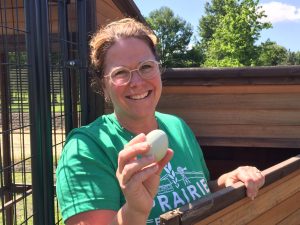 We also visited Mandy Shoemaker and her team at Prairie Eider Care, our area’s only Eden Alternative homes, and we had fun admiring their outdoor barnyard collection of silky chickens, a potbellied pig, and sassy ducks. Then we settled into their welcoming living areas. We sat in intergenerational circles with staff, family members, and residents, talking, singing, and laughing.
We also visited Mandy Shoemaker and her team at Prairie Eider Care, our area’s only Eden Alternative homes, and we had fun admiring their outdoor barnyard collection of silky chickens, a potbellied pig, and sassy ducks. Then we settled into their welcoming living areas. We sat in intergenerational circles with staff, family members, and residents, talking, singing, and laughing.
Dr. Kataria, the founder of Laughter Yoga, believes that inviting out our childlike energy and acting playfully is vital to living a balanced and healthy life. Plus, it’s tremendous fun. He says: “Laughter Yoga is an aerobic workout that helps uplift your mood within minutes by releasing endorphins from your brain cells. You often remain energized, relaxed, and in good spirits throughout the day. Laughter also makes our immune system stronger, increases oxygen intake, and reduces stress. Plus laughing with others builds a social bond and reduces feelings of isolation.”
In our groups, we created laughter milkshakes, with each person choosing their favorite flavor of ice cream. We looked at each other, waved, and laughed. We had a lot of dog lovers in our groups, so we imagined how a chihuahua would laugh. A member of the nursing team loved large dogs and she helped us to guffaw like a Great Dane. Most of our group loved baseball, so we sang, “Take Me Out to the Ballgame,” then substituted the words with “Ha Ha “ syllables, otherwise known as the Ha Ha Chorus. That chorus works for any familiar song and tickles your funny bone.
Ron and I learned Laughter Yoga from the amazing Robert Rivest, who is a master 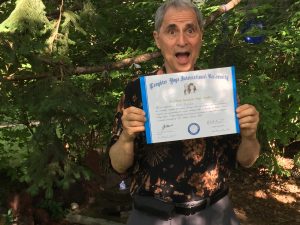 trainer and who studied with Dr. Kataria. But you don’t need to be a trained facilitator to bring more laughter into your life.
trainer and who studied with Dr. Kataria. But you don’t need to be a trained facilitator to bring more laughter into your life.
Quick Tips for Adding Laughter into the Day
•Look at the clock and laugh for one minute.
•When driving, laugh during red lights.
•When working out, pick a couple of exercises, such as squats and curls, and laugh while you’re doing them. (Want to get others laughing? Do this at the gym!)
•Use the “ha ha chorus” to bring giggles into your life. Take any song and substitute “ha ha ha’s” for the words. This works well in the shower, car, on walks and more.
Want to laugh more?
Visit laughteryoga.org and robertrivest.com
Contact Deborah Shouse and Ron Zoglin: 816-361-7878 Email myinfo@pobox.com Website: DemeniaJourney.org
If you are part of a memory care community in the KC area and you’d like to gift your residents with laughter, feel free to reach out to us at creativity@pobox.com
Click to view informative and inspiring short videos on our YouTube channel
Deborah Shouse is the author of Connecting in the Land of Dementia: Creative Activities to Explore Together and Love in the Land of Dementia: Finding Hope in the Caregiver’s Journey.
Creating a Dementia Friendly Kansas City
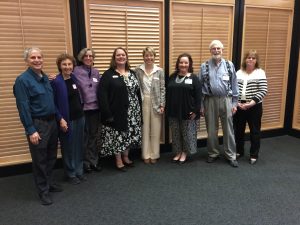 Luck. Kismet. The stars aligning. Those are all valid descriptions of our April 5th event, Creating a Dementia Kansas City.
Luck. Kismet. The stars aligning. Those are all valid descriptions of our April 5th event, Creating a Dementia Kansas City.
First, we were lucky to have two great speakers: Emily Kearns, PhD, formerly of Dementia Friendly Massachusetts and Michelle Niedens, from the University of Kansas Alzheimer’s Disease Center.
Then, a lovely splash of kismet when Emily and April Roy, Director of the Plaza Library, were invited to join Gina Kaufmann on KCUR’s Central Standard.
Thanks to Central Standard and lots of grass roots marketing, almost 100 people attended 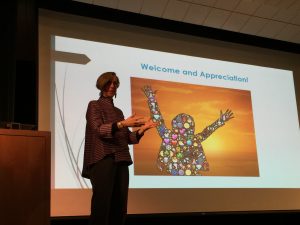 from many different sectors. Our attendees included representatives from The Alzheimer’s Association, The Nelson-Atkins Museum of Art, The Kansas City Symphony, The Renaissance Festival, KC Actors Theatre, The Naka-Kon Anime Convention, the Mayor’s office of Culture and Creative Services, as well as the medical and healthcare communities, senior services providers, the library community, first responders, faith communities, social work consortiums, people who are living with dementia and their friends and care partners, community volunteers, and more.
from many different sectors. Our attendees included representatives from The Alzheimer’s Association, The Nelson-Atkins Museum of Art, The Kansas City Symphony, The Renaissance Festival, KC Actors Theatre, The Naka-Kon Anime Convention, the Mayor’s office of Culture and Creative Services, as well as the medical and healthcare communities, senior services providers, the library community, first responders, faith communities, social work consortiums, people who are living with dementia and their friends and care partners, community volunteers, and more. 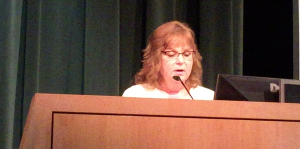
Our vision was beautifully articulated by our two speakers: “We envision Kansas City as a community where every citizen feels welcomed, valued, and engaged.”
We’ve only just begun and we welcome your support.
Click on this link to enjoy a brief sampling of our Dementia Friendly Kansas City official launch
Click here to preview some inspiring action steps
Click to view informative and inspiring short videos on our YouTube channel
Please consider joining us for our follow through Lunch and Learns.
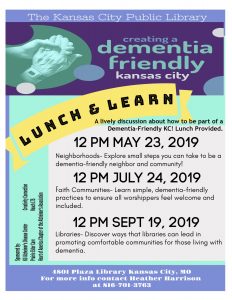
Deborah Shouse is the author of Connecting in the Land of Dementia: Creative Activities to Explore Together and Love in the Land of Dementia: Finding Hope in the Caregiver’s Journey.
Pick the Best Care Community for Your Loved One
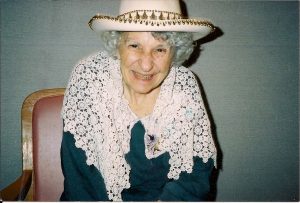
My hands were sweating as Mom, Dad, and I entered the memory care unit. We desperately wanted to pick the best care community for my mother. Pam, the head nurse, rushed towards us, arms outstretched.
“So good to see you again,” she told my father and me. She turned to Mom. “And you must be Frances. Paul has told me so much about you. I hear you’re a nurse too.”
She took Mom’s arm and they walked together down the corridor, talking. We followed and Pam stopped at a small dining area, where coffee and cookies, chocolate chip, one of Mom’s favorites, awaited us. Dad and I looked at each other and smiled. Maybe, just maybe, this was going to be all right.
We had already visited several homes and none of them seemed warm enough, caring enough, or quiet enough for Mom. What had won us over was Pam and her feeling for people who were living with memory loss, her determination to create community, her compassionate and easy way of communicating.
#
One of the most challenging experiences caregivers can face is finding the right community when your loved one needs care. Jytte Lokvig, PhD, regularly consults with families on this issue. Her new book, Moving & More, offers families concrete guidelines for finding the facility that meets their needs.
Click here to see our interview with Jytte Lokvig
When visiting a care community, Jytte suggests that we ignore the lobby and the landscaping. A beautiful lobby soothes the family’s soul but has little to do with the quality of care and engagement offered. Spend at least a couple of hours in memory care.
“Remember,” she says, “you are asking your loved one to live here. Stay on after your tour and blend into the scenery, so you can really get a sense of how staff and residents interact.”
Here’s what you want to learn:
- Does the facility practice “Person centered-care?
- Do residents participate in menu and activity choices?
- What is the staff/resident ratio?
- What are the staff retention rates?
- Do all staff receive mandatory first aid and dementia training?
- Are the family, nurse, personal care and activity staff involved in creating the resident’s care plans?
- Does the activities calendar offer a blend of entertainment and interaction?
- Are there both individual, small group, and large group activities?
- Does the staff acknowledge each resident, even with a simple greeting or compliment?
After you have a sense of the community, take your loved one to visit. Have a meal with the residents. Stay for an activity program.
“Several visits like this helps both of you feel more comfortable when the move comes,” Jytte says.
For more tips and information, visit Jytte’s site at http://www.alzheimersatoz.com and consider her book: Moving and More.
Deborah Shouse is the author of Connecting in the Land of Dementia: Creative Activities to Explore Together and Love in the Land of Dementia: Finding Hope in the Caregiver’s Journey.
Connected in the Land of Dementia: Easy Ideas and Free Events
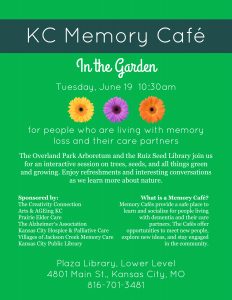
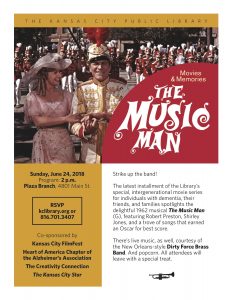
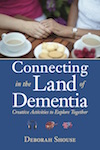
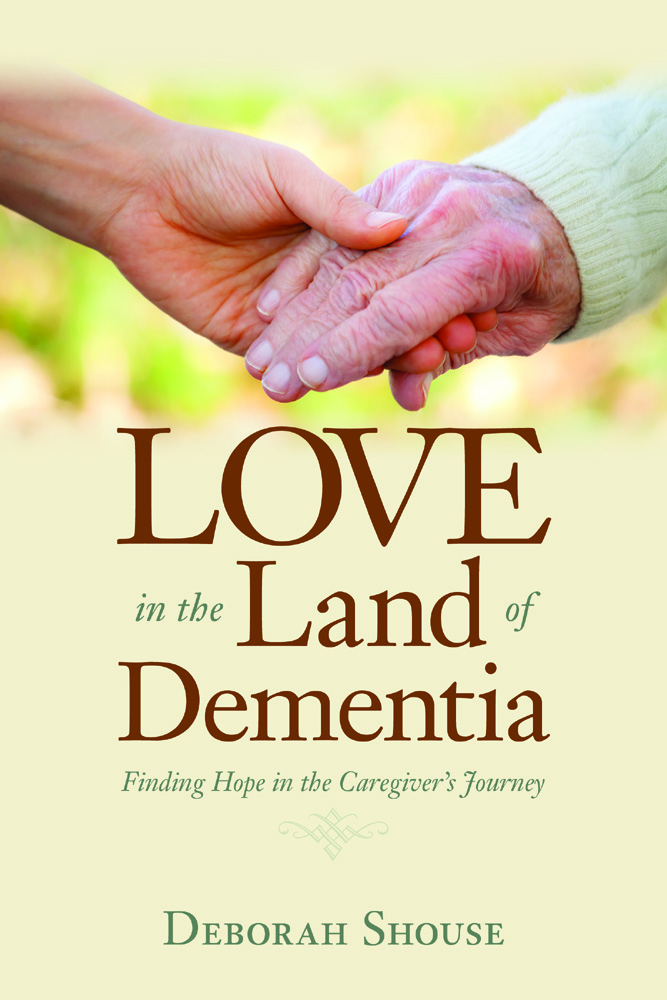
Celebrating our Mothers
If my mother were still alive, I would be taking her roses and chocolate this Mother’s Day. She would be delighted and her delight would magnify when my daughters and her great-grandchildren arrived. Love is such a beautiful glue, such a simple and strong way to stay connected. I wanted to share this story from Love in the Land of Dementia, as a way of celebrating our mothers.
The Woman She Was
 My friend Karen gives me a gift: she says, “Tell me about your mother.”
My friend Karen gives me a gift: she says, “Tell me about your mother.”
We are sitting in a quiet mid-afternoon café and I let the question sink into me.
When friends occasionally ask me, “How is your mother doing?” I have different answers, depending on the situation. If we are in one of those conversations that are like confetti in brisk wind, I say, “She’s okay.”
If we are sitting across from each other and my friend is looking right at me, I answer, “She’s pretty deep into Alzheimer’s.”
“Does she recognize you?” she might ask.
“No, but she may recognize I am a person she likes,” I answer.
That usually ends that conversation.
But “Tell me about your mother,” is an invitation I don’t usually get.
“What would you like to know?” I ask.
She stirs her iced mocha. “Whatever you want to tell me,” she says softly. “I would like to know about her life and her interests.”
Since my mother has been in the nursing home with Alzheimer’s, I have seldom talked about the person she used to be. Occasionally my father and I reminisce about family vacations and outings. I sometimes ask Dad questions about our growing up days and the early days of their courtship. But I rarely think about the woman I knew all my life, the mother, grandmother, artist, gardener, compassionate friend, avid reader, bird-watcher, early morning walker, lemon-meringue pie baker. That woman is gone and I have spent a lot of energy learning to know and appreciate the woman who now commandeers her body.
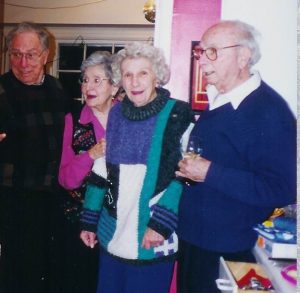 As I consider what I want to tell Karen, I remember visiting my mom’s best friend, Bel, in California when I was a teenager. Bel, who was spunky and adventurous in a way that seemed so different from my conservative mother, drove me from Berkeley to the small resort where I would work as a chambermaid for the summer.
As I consider what I want to tell Karen, I remember visiting my mom’s best friend, Bel, in California when I was a teenager. Bel, who was spunky and adventurous in a way that seemed so different from my conservative mother, drove me from Berkeley to the small resort where I would work as a chambermaid for the summer.
“Do you know how I met your mom?” she asked me, as we drove down the winding roads, past fragrant stands of eucalyptus trees.
“In Iceland, during the World War II,” I said. I had heard stories of the two of them taking a break from their work in the hospital by skiing, then stopping for a soak in a hot springs.
“No, we met earlier in Chicago. We were both nurses working the twelve-hour night shift. The hospital had a room with a couple of bunk beds so we could rest on breaks. One night I walked in there and heard the most heart-breaking sobbing. It was Frances, crying her eyes out. I asked her what was wrong and she said, ‘Nothing.’”
I smiled. That sounded like Mom, never wanting to admit anything was wrong.
“Then I asked her again and she sobbed out that her husband Sam had died six months ago from pneumonia. She was so sad she didn’t know if she could go on. A bunch of other nurses and I were going to Florida for a short vacation and I persuaded your mother to join us. But as it turned out, we never went; a week later I decided to join the Army and I encouraged her to come along. We’ve been best friends ever since.”
When I heard this story at the age of seventeen, I was too young to fathom my mother’s grief and despair. By the time I told Karen the story, I had some sense of what my mother must have gone through.
“Your Mom was really brave, to serve in the Army during wartime,” Karen says.
I feel a little swell of pride. Mom’s tales of traveling in the darkest night on the troop ship, with bombs falling nearby, were so familiar I had never considered her bravery and courage.
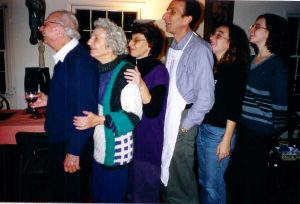 Now I tell Karen how my father, encouraged by Bel’s husband, wrote Mom a letter, telling her he was ready to marry a nice Jewish girl. Was she interested? Was she available?
Now I tell Karen how my father, encouraged by Bel’s husband, wrote Mom a letter, telling her he was ready to marry a nice Jewish girl. Was she interested? Was she available?
After some correspondence, Mom surprised herself by agreeing to meet him in Chicago. At the end of the week, my father asked her to marry him. She considered the offer for three weeks and accepted. Their whirlwind romance was fueled by practicality.
“What a great story,” Karen says. “Your mother must be an amazing woman.”
Sparked by Karen’s interest, I let myself feel my love for my mother as she used to be. I am in tears by the time our conversation ends.
“Thank you for asking me about my mother,” I say to Karen.
“Your stories make me want to call my own mom and hear her stories again.”
As I drive home, I think of more “mom” stories to share with my children and my brother. I see myself, along with my brother and father, as the carrier of my mother’s sacred legacy. I imagine myself tenderly fanning the embers, adding dry leaves and crumbled paper, creating a blaze with each memory. I realize I don’t have to give up Mom’s old self: I can be her historian and her scribe, carrying her stories with me, and making sure they live on.


A Memorable Meeting: KC Memory Cafe
You know what it’s like, creating a program series for the first time. You try to think of everything, knowing that you’ve probably left something out. You hope plenty of people will attend and worry that no one will show up. The weather teases you, threatening snow or rain, thunder or wind. The “what if’s” line up, a mean group of scolders: “What if the elevator breaks? What if the speaker doesn’t show up? What if the snacks don’t arrive? What if the KC Memory Cafe doesn’t work!”
But, as most of us know, worry isn’t really that useful.
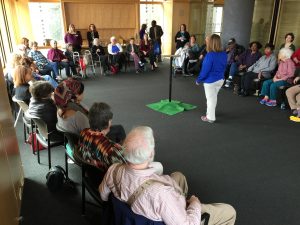 The debut of the KC Memory Cafe was beyond our highest expectations! On March 20, 2018, at 10:30 at the Plaza Library, the educators from the Kansas City Zoo showed up early, riding the elevator down to the lower level with their exotic offerings. The weather was perfect and a lovely group of 40 plus care partners and people living with dementia joined us, delighting in the delicious snacks. And they were even more delighted with the program, all of us laughing at the antics of the cockatoo, leaning forward to see the Vietnamese Tree Frog cozied in his glass aquarium, and petting the chinchilla, with a fluff of fur that felt like a cloud.
The debut of the KC Memory Cafe was beyond our highest expectations! On March 20, 2018, at 10:30 at the Plaza Library, the educators from the Kansas City Zoo showed up early, riding the elevator down to the lower level with their exotic offerings. The weather was perfect and a lovely group of 40 plus care partners and people living with dementia joined us, delighting in the delicious snacks. And they were even more delighted with the program, all of us laughing at the antics of the cockatoo, leaning forward to see the Vietnamese Tree Frog cozied in his glass aquarium, and petting the chinchilla, with a fluff of fur that felt like a cloud.
“I love this animal,” one attendee said, smiling at the blue tongued skink.
“This is the softest fur I’ve ever experienced,” said another, reveling in the chinchilla.
“That bird is so funny,” said another, laughing as the cockatoo bounced up and down, “dancing.”
After learning about the animals, we talked about our own pet memories. It was a wonderful morning and we can’t wait for our next Memory Cafe, on April 17, 2018.
Click here so you can experience the fun of the Cafe.
https://drive.google.com/open? id= 1mU8Iw83lGbhw6FeAVJ3VQ8xhe75qt YYm
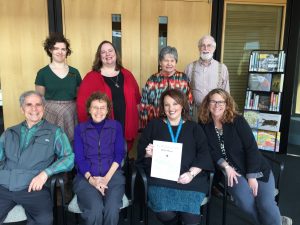 Want to join us on April 17 for our next Cafe? Here’s the scoop!
Want to join us on April 17 for our next Cafe? Here’s the scoop!
Weather Wonders: The Inside Story
Metereologist Karli Ritter Reveals Weather Mysteries 10:30 am on Tuesday, April 17, 2018. Plaza Library Lower Level. Join us for the KC Memory Cafe, a free event dedicated to creating educational and social experiences for people who are living with memory loss and for their care partners.
Our Team — Standing: Emily Cox, April Roy, Carol and Dennis McCurdy. Sitting: Ron Zoglin and Deborah Shouse, Jennifer Walker, Mandy Shoemaker
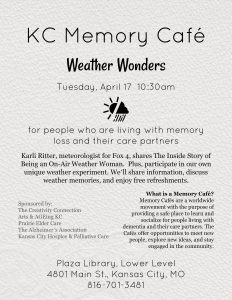


Dementia in the Land of Vietnam
“We are here to see Dr. Nguyen Thanh Binh, head of the Department of Neuroloy and Alzheimer Diseaese,” I tell the guard at the National Geriatric Hospital of Vietnam in Hanoi, showing him my folded paper with her name printed on it.
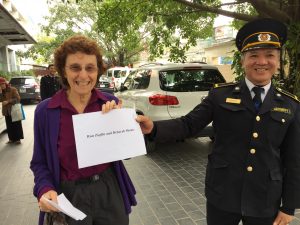 He grins, then points to a full size sheet of paper in the security booth’s window with our names printed on it. We follow him into the hospital and up a flight of stairs. After a short wait, Dr. Binh warmly welcomes us into her office. She has a table ready with chairs and tells us she has invited others from her department to talk to us as well. Another Dr. Nguyen Thanh Binh arrives. Her Phd thesis was on easing the burden for family caregivers. Dr. Ngan Thi Hong Anh, doctor of rehabilitation, joins us. She seeks non-medical solutions for improving quality of life. Nguyen Ngoc Anh, RN, completes our group. She works daily, communicating with and caring for people who are living with dementia.
He grins, then points to a full size sheet of paper in the security booth’s window with our names printed on it. We follow him into the hospital and up a flight of stairs. After a short wait, Dr. Binh warmly welcomes us into her office. She has a table ready with chairs and tells us she has invited others from her department to talk to us as well. Another Dr. Nguyen Thanh Binh arrives. Her Phd thesis was on easing the burden for family caregivers. Dr. Ngan Thi Hong Anh, doctor of rehabilitation, joins us. She seeks non-medical solutions for improving quality of life. Nguyen Ngoc Anh, RN, completes our group. She works daily, communicating with and caring for people who are living with dementia.
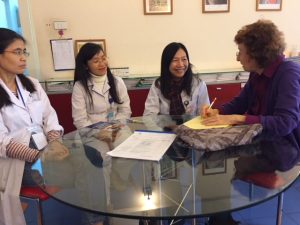 For two years. Dr. Binh and her team have been running a pilot study, inviting people who are living with dementia to attend a three day a week program that focuses on engaging socially, physically, emotionally, and intellectually. They use music therapy techniques, they bake traditional cakes together, and they enjoy various arts and crafts projects. All these therapies offer physical and occupational therapies, as well as vital social interactions. The project has been a huge success, with both family caregivers and people living with dementia enjoying the results. Besides giving the caregivers a much needed respite, families report improved quality of life and and increased abilities in the activities of daily living.
For two years. Dr. Binh and her team have been running a pilot study, inviting people who are living with dementia to attend a three day a week program that focuses on engaging socially, physically, emotionally, and intellectually. They use music therapy techniques, they bake traditional cakes together, and they enjoy various arts and crafts projects. All these therapies offer physical and occupational therapies, as well as vital social interactions. The project has been a huge success, with both family caregivers and people living with dementia enjoying the results. Besides giving the caregivers a much needed respite, families report improved quality of life and and increased abilities in the activities of daily living.
“Symptoms improve,” Dr. Binh reports. “Patients want to keep attending and families have their burdens eased.”
Dr. Binh and her team have extended the program.
 Often people come to the hospital, seeking answers to issues related to memory loss. Many elders live at home with extended families, and their children and grandchildren are frequently confounded by their cognitive impairments and other symptoms of dementia. Dr. Binh and her associates offer education, information, and comfort. They describe the disease and try to help families move beyond their initial feelings of hopelessness. They encourage families to accept and embrace their elder and support him or her in living a meaningful life.
Often people come to the hospital, seeking answers to issues related to memory loss. Many elders live at home with extended families, and their children and grandchildren are frequently confounded by their cognitive impairments and other symptoms of dementia. Dr. Binh and her associates offer education, information, and comfort. They describe the disease and try to help families move beyond their initial feelings of hopelessness. They encourage families to accept and embrace their elder and support him or her in living a meaningful life.
We left our meeting with these remarkable women feeling inspired. They are doing important work and making a difference for the people of Hanoi and Vietnam.


Transferring Skills and Adapting Purpose: Wisdom from Paulan Gordon
As Director of Operations for a national call center, Paulan Gordon’s work required an intense travel schedule, detailed project management skills, and a rigorous adherence to industry standards. So when she started feeling confused, she attributed the struggles to stress. Some days, she felt so overwhelmed that she locked herself in her office and called her husband to come pick her up early.
She was asked to step down from her position. Initially, the loss of her career was both financially and emotionally staggering. Suddenly, she had no purpose, no income, and no peer group. She had to reinvent her life.
In 2012, at the age of 57, Paulan was diagnosed with vascular dementia. After a period of uncertainty, Paulan began using her interpersonal, communication, and management skills and volunteering as a mentor and a dementia advocate.
“I’ve learned there’s a lot more to life than success in business,” she says.
Building Friendships
When she was working, Paulan was so busy she didn’t have time to build friendships. Now, through her mentoring, she has developed deep connections with others who are living with dementia.
“The relationships you create within the walls of dementia are so intimate,” Paulan says. “People talk very openly about their personal problems and challenges. I feel enriched, being part of these conversations and having such close friends.”
Her work as a dementia mentor has also given Paulan a sense of purpose.
“I work with four people and all of them appreciate my phone calls and my caring. That appreciation boosts my spirits,” she says.
Through her mentoring and advocacy work, she’s met doctors, lawyers, teachers, entrepreneurs, and others who have applied their intelligence and skills to living successfully with dementia.
Speaking out for Adaptation
When Paulan gave business speeches, her hands grew clammy and her mouth dry. She battled nervousness and worried about getting facts wrong and making errors.
“Now, I don’t get very nervous,” she says. “I’m speaking from my heart about things close to me, so I can’t make a mistake. Plus, I’m motivated: I want to help others and I want people to understand the truth about dementia.”
Letting Go of Difficulty
“You’ve asked me that question five times already,” Paulan’s husband says.
“Then it must be really important,” she answers.
Paulan is happy she can laugh at trying situations. She has let go of things she can no longer do. She stopped driving because spatial relationships were difficult for her. Paulan knows she’s forgetful and sometimes repeats herself. Her husband and family take that repetition in their stride. She’s also trained her family not to interrupt her when she’s talking, because she can easily lose track of what she was saying.
“My husband doesn’t call attention to my deficits and I forget I have them,” she says.
Proactively, he reminds her about meetings and appointments. She uses a big planner and makes detailed notes, including instructions on how to sign onto the internet, and notes on various conversations.
Changing Reading and Money
Paulan is constantly using her creativity to solve problems. She was an avid reader, but her memory retention has diminished and understanding complicated novels with dozens of characters became a challenge.
“If I put down a book, I can’t remember what happened at the beginning,” she says. “Although there is an upside to the situation: I could save money reading the same books over and over again.”
She temporarily put down her tomes and started reading short stories and magazines. This allowed her to continue her beloved hobby without so much frustration.
She also worked around her reduced mathematical abilities. When she shops, she hands the cashier an extra dollar, so she doesn’t get overwhelmed by counting out coins.
“I hope people are honest when they give me change,” she says.
Stirring up her Spirits
“I don’t worry about dying” she says. “I basically feel positive.”
Many people have a distorted view of dementia. With her speaking and writing, Paulan helps people understand the truths of the disease.
“I like sharing ways to support friends and loved ones who are living with dementia,” she says. “This information helps prevent decline and dramatically increases the well being of both care partners and people living with dementia.”
Meanwhile, Paulan’s advocacy and mentoring work has filled her life with depth, friendships, creativity, and purpose.


Moving from Depression to Purpose: Wisdom from Dementia Advocate and Mentor Robert Bowles, Jr.
Once again, Robert Bowles, Jr., age 65, could not sleep. Since he’d been diagnosed with Lewy Body Dementia two years ago, his nights had randomly been plagued with terrifying hallucinations and vivid nightmares that he often acted out. He was exhausted, depressed, and anxious. Plus, he had had to sell his beloved pharmacy and prematurely end a meaningful 40-year career as the community’s trusted pharmacist.
That dismal night, Robert awoke at 1:00 a.m. and dragged himself into his office. He felt a horrible heaviness in his heart
and he cried out to God.
“God,” he said, “Take me home. I don’t want my family to go through this disease. I can’t endure this any longer.”
As he sank into a chair, he heard a voice, as strong and clear as if someone was sitting right beside him: “Use your five life principles for people who are living with dementia.”
Robert slapped his hand onto his forehead and said to himself, “God is not through with me yet.”
And that realization filled him with hope.
Amending His Purpose: The Five Principles
Love, care, education, encouragement, and hope: these were the principles Robert adhered to with his work, his family, and in his community.
“Understanding that those same tenets could help families affected by dementia was a transformational experience that gave me purpose,” he says.
Robert believes, “People living with dementia need to be encouraged to maintain purpose. While your original purpose may not be possible, you can always modify your vision and continue to live with depth and meaning.”
Throughout his career, Robert was always purpose-driven and outcome-oriented. Along with those qualities, he infuses his current advocacy and mentoring work with compassion. Early on, he realized, “People don’t care what you know; they want to know what you care about.”
Standing up for Personhood
“I made a decision that I would not let dementia define who I was,” Robert says. “ I’m still Robert. I believe in personhood.”
He also believes in learning, overcoming fear, and trying new things. Robert serves on the Georgia Alzheimer’s and Related Dementias (GARD) State Plan Group. He is involved with the Lewy Body Dementia Association (LBDA) and works with the Dementia Action Alliance and the Dementia Spotlight Foundation. He qualified as a trainer at the Rosalyn Carter Institute and he completed the coursework to became a Certified Eden at Home Associate. Robert has also been trained in Dementia Beyond Drugs, which teaches ways to decrease behavioral expressions without medications.
Recently, a lady asked him, “How are you able to speak when you have dementia?”
Robert answered, “When I sit there waiting to speak, my mind is all over the place. I wonder, ‘Will I be able to speak, or is the train going to jump the track?’ Then I tell myself, “I am going to have fun.”
He has fun and he speaks from his heart. Audiences connect with him.
Recently, Robert told his neurologist, “I don’t have time to die.” Every year, he typically speaks to more than 100 groups, sharing his story, breaking down stereotypes, educating people on dementia, and inspiring people to live with heart and purpose. ##
 Practical Tips from Robert
Practical Tips from Robert
Adopt the ASAP philosophy: Acceptance, Socialization, Attitude, and Purpose. Accept your disease and know you are not your disease. Keep and expand your social network. Live with a positive attitude. Be fueled by a purpose. ASAP was one of the touchstones that delivered Robert from “the Valley of Darkness.” “Both care partners and people living with dementia benefit from ASAP concepts,” Robert says.
Prepare for your doctor’s visits. As a practicing pharmacist, Robert noticed many people did not prepare for medical visits and therefore didn’t get the information they most needed. He keeps a list of his symptoms. As changes occur, write them down. Before the visit, select your top three issues. Hand this list to the nurse to give to the doctor. “You save time and get better outcomes,” he says.
For more information about Robert, please visit:
https://lbdlivingbeyonddiagnosis.com/index.html
For more information about living well with dementia, please visit Dementia Action Alliance, https://daanow.org


